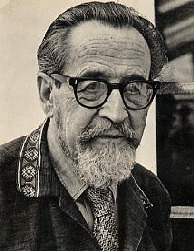*
INTRODUCTION
The opposition between man and nature stressed in the first chapters of this section of "Triptych" may disturb the reader who has been accustomed to think of man as a "natural" organism, a body-mind determined by biological heredity and social environment. It may also at first confuse the intellectual who has sought an antidote for the artificialities and anxieties of our modern living in certain Oriental ways of life, particularly Zen Buddhism which has now become quite fashionable. To people who have been stamped since childhood with the great American ideals of success, achievement, wealth and popularity, the Zen doctrine of relaxed, spontaneous, inconspicuous, goal-less and "natural" activity may well seem indeed the solution to their conflicts and harassment.
The attitude to life which I am presenting here is also based on the thought-feeling that whatever exists can only be fulfilled in the realization and actualization of its own nature. The question is, however, how one defines nature. Confusion arises in many minds simply because this term, nature, is used with two distinct meanings. "One's own nature" (svabhava in Buddhistic terminology) should not be confused with "nature" used as a widely inclusive term to refer to the over-all activities and the instincts of living organisms of all kinds everywhere on earth. When capitalized. Nature means simply the outer conditions and phenomena generally prevailing in the realm of life on earth — or, as it has been called, the biosphere.
The belief that it is man's nature (first sense) to become victorious over nature (second sense) has been a widely accepted religious and metaphysical belief. What man is to overcome, according to such a belief, is earthly nature, or more precisely the conditioning, pulls, desires, drives or ambitions which are inherent in the life-force; that is, in the instinctive, largely compulsive and unconscious manifestations of human, and indeed as well animal, existence.
Actually Zen essentially agrees with this idea of overcoming; but strong controversies have arisen concerning the method of overcoming and, deeper still, the quality of consciousness — the quality of feeling, thinking, and acting — required in the process. To take only one aspect of the question: The typical Western way is to reason out, to pit a capitalized Reason against feelings — the "higher Self" against the "lower self" — "pure" consciousness and light against "dark" unconscious instincts — "will", operating through the cerebro-spinal nervous system, against "life-urges", operating through the "vegetative system" of the body.
On the other hand, Zen and the original doctrine of TAO in China, ask of you to flow with the stream; not to oppose anything; to become empty; to experience in simple awareness, and to act in concerned spontaneity after having let go of all doctrines and social forms of bondage and devotionalism. But how can you reach such a state of absolutely free spontaneity and unobtrusive "flowing-with" the stream of existence?
At this point we come across a paradoxical situation. Effortlessness is the ideal, but the Zen monasteries are places of rigid discipline. Non-violence to, and harmony with, nature is the ideal; but the old Zen Masters were not adverse to using physical violence on their disciples; and we have the famous story of Bodhi Dharma — the great Hindu Patriarch who, having come to China and becoming the father of Zen proper, is said to have cut his eyelids because they would wearily close in spite of his will during prolonged hours of meditation. How different is this from parallel actions of Christian ascetics as well as of Hindu yogis?
Bodhi Dharma, if the story is true, used will and violence to sustain his strenuous efforts toward a spiritual goal. The rigid discipline and frugal life in the Japanese Zen monasteries is a paradoxical method of attaining freedom through coercion. In all teachings of the spiritual life, whether Eastern or Christian, paradoxes abound — the most famous instance being Jesus' teachings called the Beatitudes. India's Bhagavat Gita is also actually a long paradox. Arjurta is told to fight because it is his "nature", dharma, as a man of the Warrior-Caste; but he is shown how to fight while not becoming "involved" in the fight.
The idea of an effortless striving and an unconcerned ambition is as central an idea in Jesus' Gospel as in Hinduism or Japanese Zen. One must have purposefulness, yet no ego-formulated goals. There must be ever-renewed victories, but no sense of superiority or achievement in victory. Man is a natural being whose nature is to overcome the nature which opposes him, yet he is fulfilled in his victory. Man is also a social being whose one creative social function is to overcome the conformism of a society which can only grow in meaning through the acts of individuals who challenge its power and its patterns.Is this all non-sense? All spiritual paradoxes are significant non-sense. When you live them through, you become their meaning. Thus the traditional reply to the question: What is Zen?—"Walk on." You may stumble, and if you do, neither nature nor society will have much pity. You may stumble by being too eager, too strenuous, too concerned over results; or by being too weary, too lax, unresponsive and insensitive. But you cannot stop. Nature will not let you stop.
What, then, is nature? It is that which, overcome by you, finds itself full of meaning in the very moment of your overcoming. Realizing this, we may speak of "the Eternal Feminine," and pass on. If we do not "pass on," we are caught. Yet we cannot just pass on beside, for there is no space for men on earth outside of nature. There is only one way to pass on, and it is to go through.

